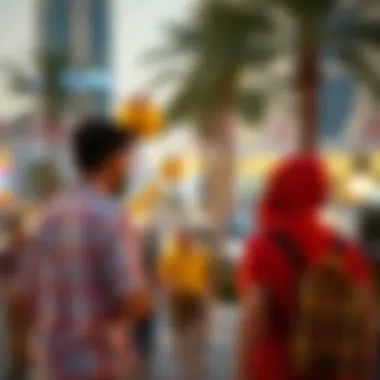UAE Public Holidays 2024: Insights and Impacts


Intro
The United Arab Emirates (UAE) stands as a melting pot of diverse cultures, traditions, and modernity. Public holidays in the UAE are not just days off; they embody the essence of the nation, celebrating its rich historical tapestry while weaving in the influences of its rapidly evolving society. As we stride into 2024, understanding the significance of these holidays becomes paramount for various stakeholders, including investors, residents, and visitors.
Each public holiday offers a glimpse into the values that shape Emirati society, while also presenting opportunities in the real estate and tourism sectors. Analyzing these holidays aids in grasping their potential impacts on the market and community dynamics. Hence, this overview will dive deep into the significance, timing, and implications of each public holiday, providing stakeholders with a clearer picture of the landscape.
As we embark on this analytical journey, it is crucial to not only recognize the holidays but also to comprehend how they coalesce with economic activities, community engagements, and investment prospects. From traditional festivities to modern observances, the calendar is dotted with opportunities just waiting to be explored.
Intro to UAE Public Holidays
Public holidays in the United Arab Emirates hold a place of deep significance within the social and cultural fabric of the nation. These holidays are not merely days off work; they represent a blend of religious observance, tradition, and communal togetherness that resonates with residents and visitors alike. This article aims to provide a comprehensive overview of public holidays in 2024, shedding light on their broader implications and the way they shape the community's interactions and engagements.
Significance of Public Holidays
In the UAE, public holidays serve multiple purposes. Firstly, they act as a reminder of the rich heritage and diverse background of the country. For instance, holidays like Eid al-Fitr and Eid al-Adha follow important Islamic traditions, commemorating the end of Ramadan and the willingness of Prophet Ibrahim to sacrifice his son. These celebrations aren't just about days off; they're about honoring values of faith, family, and compassion.
Furthermore, public holidays can boost local economies. With many residents choosing to travel or dine out, businesses often see a surge in activity. For investors and analysts, understanding these trends can translate into valuable insights about seasonal demands in various markets. By being aware of the implications of these holidays, investors can make informed decisions regarding real estate or other business ventures.
"Public holidays are not just a time to rest, they open doors to communal gatherings and economic opportunities, creating a cascade of effects that ripple through the marketplace."
Cultural Context of Celebrations
Celebrations in the UAE are often imbued with cultural richness and regional flair. Each public holiday embodies unique customs, from the communal prayers of Eid to the fireworks and festivities of the UAE National Day. They provide opportunities for individuals to come together, fostering a sense of unity that is particularly strong in a country with a highly diverse population.
During Eid al-Fitr, for example, it’s customary for families to visit each other, share meals, and even give Zakat, or almsgiving, to those in need. This creates not only familial bonds but also strengthens community ties. In contrast, UAE National Day celebrations echo national pride with events ranging from parades to cultural displays that highlight the nation’s journey toward unity and progress.
In essence, public holidays are a canvas where cultural diversity blends harmoniously with traditions, illuminating the unique spirit of the UAE. As such, they are crucial for understanding the societal values that influence public behavior, which can be an important factor for anyone engaging with the UAE market.
List of Public Holidays in
Understanding the public holidays in the UAE for 2024 is crucial for various stakeholders, including investors, agents, and buyers. These holidays not only mark significant cultural moments but also impact economic activities in the region. Knowing when these dates fall assists in planning and strategizing investment moves, property launches, or even personal leisure activities.
The calendar of public holidays reflects the UAE's values, traditions, and religious observances, serving as a barometer for social practices and economic behavior. Let's delve into each holiday, unraveling their significance and implications for businesses and residents alike.
New Year's Day
New Year's Day, observed on January 1, symbolizes fresh beginnings. It serves as a cultural benchmark where families and friends gather to celebrate. While it may seem like a holiday of leisure, it sets the tone for the business year ahead. Many companies take time off to reflect on past achievements and plan future endeavors, influencing productivity and mood in the workplace.
Eid al-Fitr
Eid al-Fitr, marking the end of Ramadan, is a vibrant celebration characterized by feasts and gifts. In 2024, it is expected to occur around mid-April, depending on the lunar calendar. The economic implications are substantial as people often spend generously on food, clothing, and gifts. The holiday fosters community relationships, making it vital for businesses targeting retail and hospitality sectors to plan promotional activities during this period, capturing the festive spirit.


Arafat Day
Arafat Day, observed a day before Eid al-Adha, holds profound spiritual significance for Muslims participating in the Hajj pilgrimage in Mecca. This day is a time for reflection and prayer, marking a focus on personal and communal spiritual journeys. It typically leads to a slowdown in business operations, as employees often take this day off to prepare for the festivities of Eid, impacting productivity levels across sectors.
Eid al-Adha
Eid al-Adha, also known as the Festival of Sacrifice, is a significant occasion for Muslims commemorating the willingness of Ibrahim to sacrifice his son. Expected to be celebrated in late June or early July in 2024, this holiday is pivotal for the animal husbandry markets, spurring increased demand for livestock. Moreover, many businesses in the food and entertainment sectors capitalize on the holiday by offering special deals and events, thereby enhancing sales during this period.
Islamic New Year
The Islamic New Year, or Hijri New Year, although not widely celebrated as the Gregorian New Year, does have its spiritual importance. It marks a new beginning in the Islamic calendar and is generally observed quietly. In 2024, it will likely fall in early July. Businesses may see minimal impact during this holiday; however, it still serves as a reminder for long-term planning and reflection, both personally and professionally, leading into the second half of the year.
Prophet Muhammad's Birthday
Celebrated on the 12th of Rabi al-Awwal, this holiday commemorates the birth of Prophet Muhammad. In 2024, it will occur in late September. This is a time of reflection, prayers, and charity among the Muslim community. Despite being a national holiday, its observance varies regionally and might affect business operations differently depending on local customs adopted by communities.
UAE National Day
UAE National Day on December 2 celebrates the nation’s formation and unity. It's a time of patriotic pride and community celebrations, featuring parades, fireworks, and cultural events. The holiday has immense economic significance, with local businesses seizing the opportunity to offer promotions and sales that capitalize on the festive atmosphere. For investors, recognizing the uptick in consumer spending during this period is pivotal for strategic engagement in the market.
Each holiday in the UAE carries unique cultural weight and economic potential. Understanding their nuances helps in making informed decisions related to investments and operations, reflecting the broader dynamics of the UAE’s marketplace.
Understanding Holiday Dates and Variability
The significance of understanding holiday dates in the context of UAE public holidays is twofold. Firstly, it aids in planning and preparation for citizens and expatriates alike. As these holidays are intricately linked to the Islamic calendar, which is a lunar calendar, knowing how these dates vary each year is crucial. Secondly, it impacts various sectors, particularly in real estate, tourism, and retail, making it vital for investors and businesses to stay informed about holiday trends.
Gregorian vs. Islamic Calendar
To fully grasp the nuances of holiday dates in the UAE, one must appreciate the distinction between the Gregorian and Islamic calendars. The Gregorian calendar is solar-based and has a fixed annual count of 365 days, while the Islamic calendar is lunar, comprising 354 or 355 days in a year.
This difference leads to a shift in holiday dates each year; for instance, Eid al-Fitr and Eid al-Adha can fall approximately 10 to 12 days earlier in the Gregorian calendar each year. Such variability means that the time to prepare for celebrations adjusts annually, affecting everything from travel plans to shopping habits.
Moreover, the significance of specific dates can change based on religious observations, unlike fixed holidays found in the Gregorian system. For instance, determining the start of Ramadan, which is the month of fasting, relies on the sighting of the moon, leading to greater variability in when it begins and ends.
Understanding these differences can save investors time and help them align their business strategies accordingly.
The Role of Moon Sighting
Moon sighting holds a pivotal role in determining the dates of Islamic holidays. Unlike Western traditions where dates remain consistent year-to-year, Islamic festivities are set based on lunar observations. This tradition is rooted in centuries of astronomical practices and religious teachings, emphasizing community and shared experiences during holy periods.
When the crescent moon is sighted, it signals the commencement of Ramadan or Eid celebrations. This reliance on visible moon phases introduces a degree of unpredictability that can create challenges for those planning events or conducting business. For example, hotels and travel agencies often find themselves in a scramble as holiday dates can be confirmed just days before the actual events.


The variability also allows for a unique cultural phenomenon within the UAE. The anticipation of announcements regarding moon sightings brings communities together, fostering shared excitement and engagement.
Impact of Holidays on the Real Estate Market
The public holidays in the UAE serve not only as a time of celebration but also as pivotal moments that can significantly influence the real estate market. The unique cultural fabric of this region, intertwined with its economic dynamics, renders these holidays crucial for both existing stakeholders and potential investors. Understanding the implications of these holidays is essential for making informed decisions about real estate investments.
Seasonal Trends in Property Demand
Public holidays have a unique way of shifting property demand within the UAE. During festive periods, like Eid al-Fitr and National Day, there tends to be an uptick in interest for both residential and commercial properties. This surge can be attributed to several factors:
- Cultural Celebrations: The festive atmosphere often leads to an increase in family gatherings and social activities, making properties suitable for gatherings more appealing. Many families search for larger homes or rentals that can accommodate events during the holidays.
- Tourism Boost: Holidays attract tourists to the UAE, boosting short-term rental markets. Investors in properties located near tourist hotspots often see increased rental yields during these periods, capitalizing on the influx of visitors looking for accommodations.
- Promotional Offers: Real estate developers might roll out special holiday promotions or discounts on properties during festive times, enticing buyers to invest. Thus, this can create effectively strategic opportunities for investors willing to act quickly.
Changes in the market often occur before and after public holidays as well. For example, just before Eid, there's usually a frantic rush by families to finalize their housing arrangements, leading to spikes in rental rates and property sales. On the flip side, the market can experience a lull right after a holiday as people return to their routine.
Business Operations During Holidays
The impact of public holidays on real estate isn't just about property demand; it extends to how businesses operate during these times. Construction companies, property management firms, and real estate agencies often adapt their operations based on the holiday calendar:
- Construction Pause: Major construction activities frequently come to a halt during public holidays, particularly during Eid breaks. This can lead to delayed project timelines and shifts in market readiness. Investors should be aware that while demand might increase, supply can face constraints due to these work stoppages.
- Open House Events: Real estate agencies often leverage holidays to host open house events or promotional activities. These events draw both locals and expatriates, giving potential buyers and renters a chance to explore their options. An inviting atmosphere during a holiday can lead to heightened interest in properties.
- Working Hours Flexibility: Many businesses adjust their operating hours around holidays, which can affect responsiveness and accessibility in the real estate market. Investors should consider this while planning their real estate strategies around peak seasons and holiday schedules. It’s essential to stay updated on specific operational changes to seize opportunities effectively.
"Understanding the rhythm of public holidays is key to navigating the UAE real estate market effectively."
In summary, the interplay between public holidays and the real estate market in the UAE forms a complex landscape where cultural significance meets economic dynamics. Investors, agents, and analysts must remain vigilant about these trends, as they can dictate market opportunities and challenges throughout the year.
Cultural Activities Associated with Public Holidays
Public holidays in the UAE are not merely days off work; they serve as vibrant occasions that reflect the nation's rich culture and shared values. These festivities typically encapsulate local customs, traditional practices, and communal ties, making them central to the fabric of Emirati society. Understanding these cultural activities is vital for various stakeholders, including investors, agents, buyers, and analysts, as they offer insights into social dynamics and community engagement during these pivotal times.
Festivals and Events
Each holiday in the UAE is characterized by its unique festivals and events that resonate with the populations' historical and religious significance. To illustrate, Eid al-Fitr marks the end of Ramadan and is celebrated with grand feasts, family gatherings, and acts of charity. Streets come alive with decorations and special markets, showcasing local crafts and culinary delights.
Moreover, during National Day, there are parades and fireworks, which not only bring people together but also attract tourists. These festivities can lead to increased foot traffic in key areas, benefitting businesses, especially in retail and hospitality sectors.
An organized array of events facilitates community building, where residents and visitors alike can engage fully, thus enriching their experience. This is particularly important for the real estate market. Properties in vibrant areas tend to see a boost in demand, notably during holiday seasons when events draw larger crowds.
"Public holidays serve as a catalyst for cultural expression and economic vitality, making them an essential aspect of life in the UAE."
Tourism Opportunities
Public holidays present unique opportunities for tourism in the UAE. Each commemoration is meticulously planned, showcasing traditions that attract both local and international visitors. For instance, during Eid al-Adha, many hotels offer special packages that include traditional meals, cultural performances, and excursions, which can significantly enhance a tourist's stay.


Moreover, the UAE's diverse cultural background means that holidays often incorporate elements from various cultures—an aspect that appeals to a wide audience. Visitors may indulge in activities such as:
- Experiencing traditional Emirati dances during festivals.
- Participating in community Iftar gatherings during Ramadan.
- Exploring artisan markets that sell local handicrafts.
As a result, there is a marked increase in flight bookings and hotel occupancy rates during holidays. Stakeholders in the tourism sector should consider these trends to tailor their offerings and marketing strategies effectively. This alignment not only boosts profitability but also fosters a sense of cultural appreciation and awareness for tourists who experience the UAE's heritage firsthand.
Personal and Professional Implications of Holidays
Public holidays in the UAE come with a slew of personal and professional considerations that can make or break plans for both residents and businesses. Understanding these implications can be a game-changer for anyone involved in the UAE’s vibrant landscape, whether they are investors, agents, or analysts. The holidays are not just days off; they are pivotal moments that reflect cultural values, social traditions, and economic implications.
The holiday periods often provide a much-needed respite for those who are bogged down by the hustle and bustle of everyday life. Planning vacations during these times can lead to enhanced family bonding and cultural engagement. Moreover, it opens up opportunities for relaxation, allowing individuals the chance to recharge their mental batteries, which is particularly important in today’s fast-paced world.
Professionally, however, the public holidays can substantially impact work environments. Many companies must adjust their workflows and schedules. Employees looking to maximize their time off find maneuvering around holiday schedules is often a juggling act.
Planning for Vacations
When it comes to planning vacations around public holidays, timing is everything. The UAE's holidays provide prime opportunities for travel, as many folks tend to align their days off with the long weekends that these holidays offer. For instance, vacation plans made around Eid al-Fitr or the UAE National Day can ensure a delightful escape from everyday routines.
Traveling during these holidays requires foresight. One must consider:
- Booking Early: Flights and accommodations can fill up faster than a kid in a candy store, especially during peak travel periods. It's vital to capitalize on early booking discounts to get the most bang for your buck.
- Destination Choices: Some might choose to flee the heat and head to cooler destinations, while others prefer to embrace local culture by participating in festive activities.
- Budgeting for Festivities: Holidays often come with additional costs, such as special meals and events. So, it’s good to sketch out a rough budget to avoid any surprises down the line.
The excitement around holiday travel is infectious, but it can lead to oversights if one isn't careful. Planning ahead not only creates a happier experience but also helps avoid the stress of last-minute scrambles.
Effect on Work Schedules
The professional landscape during public holidays in the UAE can resemble a mixed bag. While some sectors thrive during holidays—like tourism and hospitality—others may experience a drag. How do businesses cope with these ups and downs? As holidays approach, many companies enter a phase of flexible work arrangements to cater to employee needs.
Considerations include:
- Adjusting Deadlines: Companies may need to shift timelines to ensure tasks are completed before holidays. Not meeting these deadlines can result in stress.
- Keeping Operations Going: In industries that see lower demand during holidays, some employees might be encouraged to take time off on a rotating basis. However, this does ensure operational continuity as best as possible.
- Employee Morale: It's not all about work. Making accommodations for holidays can lead to higher job satisfaction, thus positively influencing retention rates.
Flexibility during the holiday season isn’t just beneficial for employees but can also encourage a more productive and engaged workforce.
Closure and Future Considerations
As we draw to a close, it's crucial to reflect on the multi-dimensional landscape shaped by the UAE's public holidays in 2024. This section highlights the essence of understanding how these days not only facilitate cultural expression but also drive economic activities. For investors and market analysts, a keen comprehension of holiday schedules is essential for crafting strategies that align with market rhythms. Public holidays create windows of opportunities, from tourism spikes to increased consumer spending, making them a particularly relevant area of focus. Recognizing these patterns can ultimately inform investment choices and business decisions.
Looking Ahead to Future Holidays
Considering the dynamic nature of the UAE’s cultural landscape, the anticipation of future holidays remains pivotal. The influx of expatriates continuously transforms the cultural fabric, potentially introducing new festivities. As such, one may expect to see more inclusiveness in celebrations that honor various international traditions. There is possibility for the emergence of additional holidays, especially those that resonate with the diverse communities residing in the UAE. Monitoring these trends provides valuable insight into social developments and can influence sectors from real estate to hospitality, reflecting the evolving identity of the UAE.
Potential Shifts in Celebration Practices
It's also worth noting that tradition is not stagnant. While many holidays are deeply rooted in cultural significance, shifts in celebration practices are likely to evolve with societal changes. The rising digital age, for instance, may result in virtual celebrations becoming more prevalent, altering how holidays are observed. Communities might leverage technology to share cultural rituals in novel ways, fostering inclusivity and broader participation. As the UAE moves forward, observing these shifts can help stakeholders in various fields, including tourism and events management, adapt effectively.
Understanding the importance of public holidays aids in making well-informed decisions in both personal and professional realms.
As we consider the future implications of holiday observances, it is clear that staying ahead requires a nuanced understanding of these factors. Investors, agents, and analysts should therefore prioritize monitoring these developments to ensure they remain responsive to the changing landscape.











